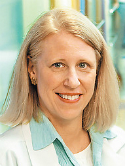Serum granulocyte colony-stimulating factor (G-CSF) levels after allogeneic T cell-depleted marrow transplantation Journal Article
| Authors: | Papadakis, V.; Diaz-Barrientos, T.; Heller, G.; Collins, N. H.; McKeever, S.; Kernan, N. A. |
| Article Title: | Serum granulocyte colony-stimulating factor (G-CSF) levels after allogeneic T cell-depleted marrow transplantation |
| Abstract: | Endogenously produced and exogenously administered granulocyte colony-stimulating factor (G-CSF) has correlated with myeloid engraftment in a number of hematopoietic progenitor cell transplantation settings. Given the increased susceptibility of T cell-depleted (TCD) bone marrow transplants (BMT) to graft failure, a cohort of 36 (21 male and 15 female) recipients of TCD BMT was evaluated prospectively during the first month post-transplant for circulating serum G-CSF levels, to examine the correlation between myeloid engraftment and G-CSF levels. All recipients of TCD BM had measurable G-CSF levels, with a median peak level of 1750 pg/ml (range 540-26 250 pg/ml) occurring at a median of 5 days (range 1-18 days) after BM infusion. There was no association between G-CSF kinetics within 1 month post-transplant and the development of primary non-engraftment or secondary graft failure. One patient with primary non-engraftment and 6 patients with secondary graft failure exhibited median G-CSF peak levels of 1600 pg/ml and 1850 pg/ml (range 600-16 250 pg/ml) occurring 5 and 5.5 days (range 4-7 days) after BM infusion, respectively. Additionally, the patient with primary non-engraftment demonstrated a high G-CSF level in response to a low absolute neutrophil count (ANC). An inverse relationship between serial G-CSF levels and concomitant ANC was documented (log G-CSF = 6.19-0.009 ANC, P < 0.001). Higher peak G-CSF levels were associated with older recipient age (P = 0.01) and lower BM cell dose (P = 0.02), while administration of anti-thymocyte globulin post-transplant did not alter G-CSF levels. |
| Keywords: | adolescent; adult; child; clinical article; treatment outcome; child, preschool; acute granulocytic leukemia; human cell; prospective study; prospective studies; t lymphocyte; t-lymphocytes; carboplatin; cohort studies; etoposide; cyclophosphamide; steroid; allogenic bone marrow transplantation; chronic myeloid leukemia; thiotepa; age; graft failure; myelodysplastic syndrome; neutrophil; kinetics; hematopoietic stem cell; leukocyte count; acute lymphocytic leukemia; graft rejection; graft survival; t cell depletion; bone marrow transplantation; granulocyte colony stimulating factor; granulocyte colony-stimulating factor; lymphocyte depletion; cell transplantation; thymocyte antibody; aplastic anemia; g-csf; middle age; diaziquone; disease susceptibility; antilymphocyte serum; human; male; female; priority journal; article; support, non-u.s. gov't; support, u.s. gov't, p.h.s. |
| Journal Title: | Bone Marrow Transplantation |
| Volume: | 15 |
| Issue: | 6 |
| ISSN: | 0268-3369 |
| Publisher: | Nature Publishing Group |
| Date Published: | 1995-06-01 |
| Start Page: | 955 |
| End Page: | 961 |
| Language: | English |
| PUBMED: | 7581097 |
| PROVIDER: | scopus |
| DOI/URL: | |
| Notes: | Article -- Export Date: 28 August 2018 -- Source: Scopus |
Citation Impact
MSK Authors
Related MSK Work






